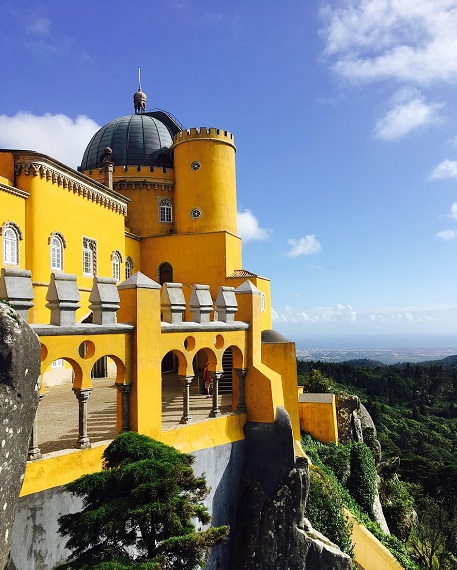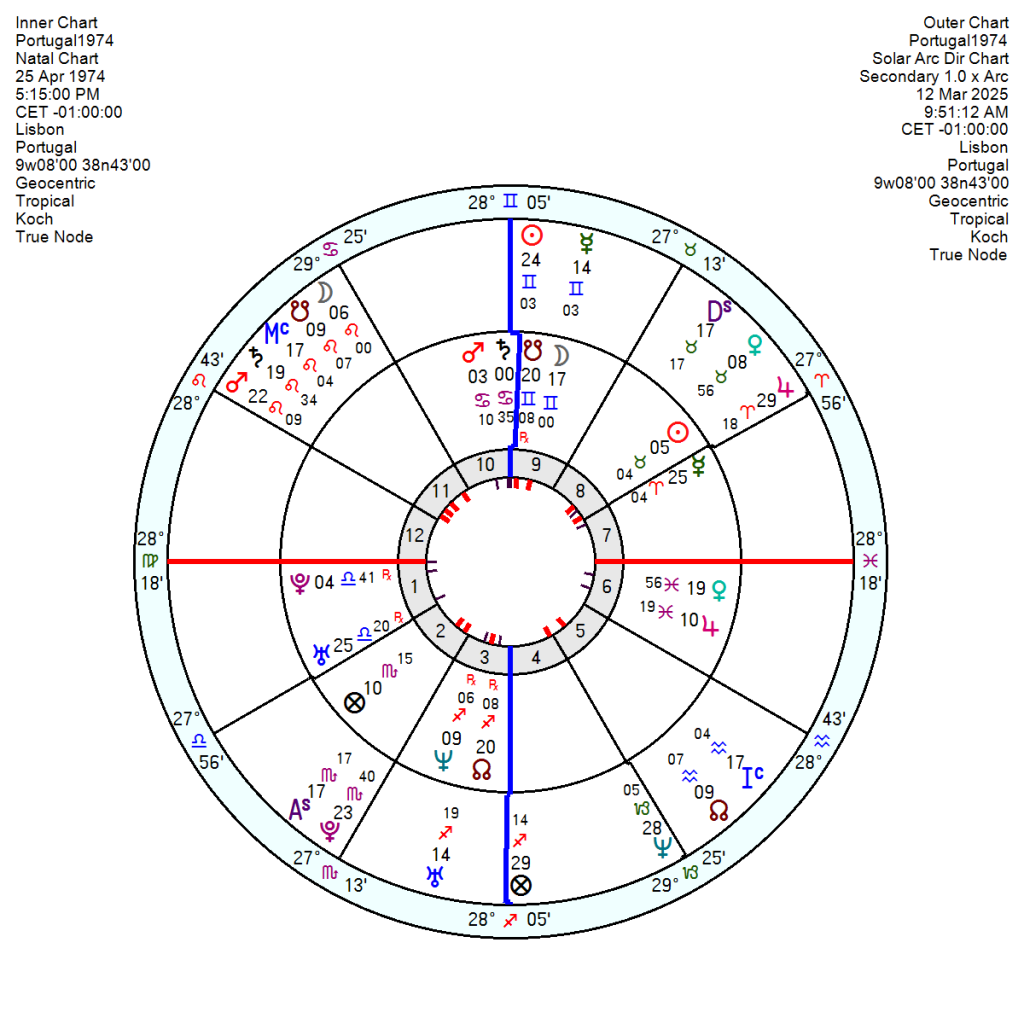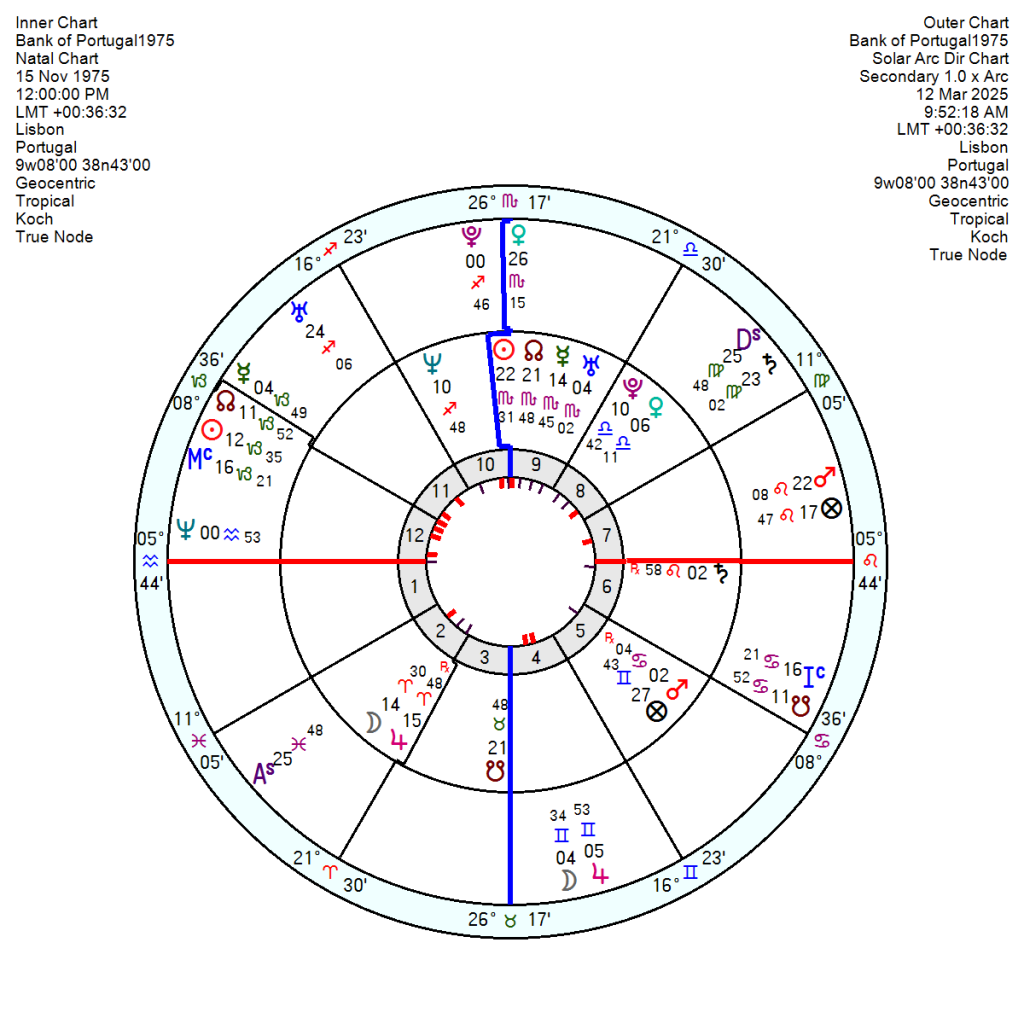



Portugal is facing its third snap election in three years after the prime minister lost a confidence vote after being accused of corruption. Concerns about immigration and a steep rise in the cost of living have helped boost the chances of the far-Right Chega party. This despite the fact that new arrivals have helped to deliver the hoped-for economic bounce.
Portugal is the poorest country among Western European nations on a GDP per head basis despite recent increases. Along with Spain it is seeing improvements that are notably lacking in Germany and France.
The Portugal 25 April 1974 5.15pm Lisbon, chart is facing a sticky few years ahead with tr Neptune and Saturn square the Portugal Saturn Mars in Cancer square Pluto between now and 2027. There will also be significant pressure for a radical change with tr Pluto square the Portugal Taurus Sun on the focal point of a yod in 2026/27. That won’t be easy but it could set the country on a different track for the future. Especially since by that time tr Pluto in Aquarius and tr Uranus in Gemini will also be in aspect to the Portugal Pluto on one leg of that yod. So opportunities for a game-changing phase.
The Portugal/EU relationship chart, always fractious at the best of times, will be even more unsettled by 2026 and beyond, with signs of a serious rift come 2027/28.
The Bank of Portugal chart, 15 November 1975 Lisbon, will be stressed, uncertain and panicky over 2025/26 with 2027 not looking too upbeat either. 2028 will see a confidence surge.
What always strikes me as worth contemplating in terms of global history is that Portugal was the maritime global superpower in the 15th and 16th Centuries and maintained its dominance until overtaken by other European powers.
It does not quite fit with Pluto Returns coinciding with a rise and fall in power, sometimes two cycles later. But the early 12th century Portugal charts have Pluto in mid to late Taurus which roughly coincides with a rise in the late 14th Century to continuing influence through the next Pluto Return in the early 17th century and a decline from the late 19th Century Pluto Return onwards.
Empires rise and empires crumble, no one country stays top dog for ever.

It is a sad fact of human nature that many tend to blame ‘others’ for their misfortunes.
If immigrants are brought in for cheap labor, they are eventually villified for whatever social ills befall their new country – including taking their jobs.
But if rich immigrants buy up homes, as was the case with Portugal’s Golden Visa, then they too are blamed for rising prices. I completely empathize with the plight of the Portuguese, but it’s not a reason to take it out on the immigrants.
In both cases immigrants were enticed. I don’t even need to address the horrific forcible taking of slaves to the US, and yet their descendants are also blamed for the country’s ills.
‘Others’ don’t even need to speak a different language or have different customs. When I lived in France, I learned that the most enduring feuds were often with the next town or village over. And this is hardly unique in many cultures – a case of “proximity breeds contempt”?
I live in Portugal and think that Salazar should be mentioned as the rules imposed were very strict for example, no freedom of speech whatsoever, women were not allowed out alone unless escorted by their father or husband. The dictatorship lasted from 1932 until 1974, although Salazar died 1970. Many people, political and social persons, were sent to Tarrafel Concentration Camp in Santiago island, Cape Verde which didn’t close until 1974, which was when the “Carnation Revolution” ended the dictatorship in Portugal. Cape Verde was the stop-over point from where slaves had been captured in Africa and the auctions were held there. C.Verde got their independence from Portugal in 1974. Portuguese people, in general are extremely calm, kind and gentle people.
Election called for 18 May 2025
I’ve learned more about Portuguese history by reading your replies then from school – and I am Portuguese born and bread.
Thank you!
It is interesting that Canada and Portugal both have Pluto in Taurus, although at a great distance in time. There is an interrelation between them. Portuguese and French fishermen were said to have come fishing off Nova Scotia and Newfoundland as early as 1450. French explorer Jacques Cartier, the official discoverer of the Gulf of St Lawrence in 1534, was said to speak Portuguese fluently. He had made several crossings to Brazil and had brought back a native slave for his wife in Brittany. The French founded Rio de Janeiro but were violently expelled BY the Portuguese. In Québec, several place names are of Basque origin. The Québec French word for moose or elk is ORIGNAL, which is also Basque, and a traditional culinary delight for both natives and European settlers.
So moose or elk is edible, possibly similar to venison? but Canada geese are not. It is these nuggets that are so informative, thank you.
The kingdom of Portugal came into existence between 26 July 1139 when Alfonso Henrique became king and 5 October 1143 when its existence was recognised by the rulers of Leon and Castile in the Treaty of Zamora. Both charts have Pluto in Taurus and the latter chart has a stellium of Neptune, Uranus, Mars, Venus and Mercury in Scorpio, Sun in Libra, Moon in Leo and Saturn conjunct Chiron in Aries. There are no planets in mutable signs. The progressed Mars is moving to conjunct the 1143 Saturn in Aries and transiting Pluto in Aquarius will eventually make aspects to all those fixed planets.
It is strange that Portugal that was an global imperial power 150 years before Britain, traded more African slaves for longer than any other nation and was one of the last to give up its colonies has never staggered under the weight of its imperial past like Britain or attracted the same level of international opprobrium.
And the maritime global superpower period you mention was intertwined with the growth of the African slave trade; Portugal eventually opening up and controlling trade with most of West Africa, where they traded extensively with local Kings and Chiefs, who supplied them with all manner of ‘goods’ including slaves. Some were transported back to Portugal to be sold; but many to the Caribbean and South America, where they were considered to be better workers than the indigenous people.
Thank you very much for this article!